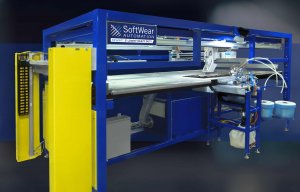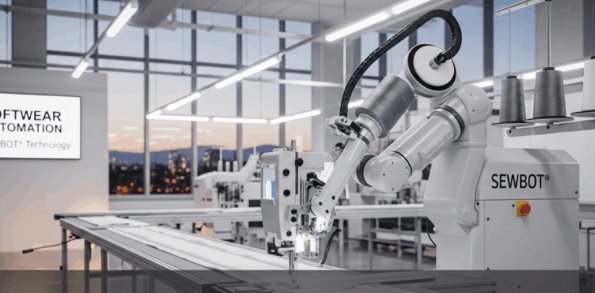
New financing for Sewbots developer
Opinion


Bestseller financing to address the textile industry’s major supply chain bottleneck.

13th August 2025
Adrian Wilson
|
Atlanta, GA, USA
Softwear Automation, the Atlanta, Georgia-based pioneer of autonomous sewing technology, has successfully closed a new $20 million Series B1 funding round, marking a new start in its mission to revolutionise sewn goods manufacturing.
Softwear Automation’s patented Sewbot technology delivers a fully autonomous sewing solution, enabling sewn products to be made closer to the consumer, with radically reduced waste, faster cycle times and superior cost-efficiency.
Sewbots are powered by smart vision technology that consists of cameras and sensors which steer and adjust fabrics deftly as they move through the sewing head in real time – just as skilled human hands do. This patented technology is at the core of every Sewbot, giving it the ability to achieve full automation of sewn goods.
Softwear Automation’s new funding round will accelerate the company’s expansion into new product categories and geographies, deepen its R&D capabilities and scale its production footprint to meet growing global demand.
It was led by a strategic investment from Bestseller, the Danish fashion company behind brands such as Jack & Jones, Vero Moda and Only, through Invest FWD, Bestseller’s dedicated innovation and investment platform.
Current investors including CTW Venture Partners, SRI Capital, MacDonald Ventures also participated in the financing.
“This partnership with Bestseller and the support from Invest FWD are not just a vote of confidence in our technology but a powerful catalyst for the future of on-demand, localised, and more sustainable apparel manufacturing,” said Palaniswamy Rajan, chairman and CEO of Softwear Automation.
Bestseller CFO Thomas Børglum Jensen has now joined the board of Softwear Automation at a time of rapid progress in commercialising Softwear’s fully automated Sewbot worklines.
“At Bestseller, we look for innovations that can support progress within the fashion industry, where change is needed,” he said. “Softwear Automation is helping address some of the key challenges we face across the industry – from speed and flexibility to lowering environmental impact. We’re pleased to support its development and explore how this technology can help us move forward.”
Background
Sewing remains the most labour-intensive of all production stages and depending on the complexity of the garments being produced, typically involves between 30-50% of the total workforce of a mill that is vertically integrated from yarn spinning through to finished garments.
As such, the final assembly of garments from their various components secures regular work for millions of people, often in regions where other job opportunities can be limited.
Software Automation first generated huge media attention with its introduction of Sewbots as fully robotic sewing machines back in 2017. The launch followed five years of development work with assistance from the Georgia Tech Advanced Technology Development Center and a contract with Darpa – the US Defense Advanced Research Projects Agency.
In a further announcement intensifying the buzz around the technology back in 2017, Chinese manufacturing giant Tian Yuan Garments, the largest producer of sportswear for adidas, announced that it was planning to purchase 21 Sewbot lines for its plant in Little Rock, Arkansas, capable of producing 800,000 cotton t-shirts per day – one approximately every 50 seconds.
Challenge
Software Automation’s deal with Tian Yuan, however, fell through and in a frank interview with Wired magazine four years later in 2021, Palaniswamy Rajan outlined some of the hurdles faced in commercialising the technology.
“The biggest challenge we have faced is the requirement of being able to operate 24/7 at high speeds and greater than 98% quality,” he said, adding that no two cotton batches are alike and variations in fabrics and dyes further complicate matters, leading to the Sewbots having to be recalibrated and interrupting operations.
Having raised $30 million in venture investments and grants by 2021, Rajan said that it would still take tens of millions more in financing to get to a target of an annual one billion t-shirts – between 1,600 and 2,000 Sewbots at multiple facilities, each with its own skilled workers to maintain them.
The real problem is that with 200 billion t-shirts currently produced every year, largely in developing countries, labour is simply too cheap.
Software Automation, however, has continued to operate a Sewbots machine vision robotic workline at its plant in Atlanta, Georgia.
With this new funding round in place, the company is now poised to take its technology to the next level.

Business intelligence for the fibre, textiles and apparel industries: technologies, innovations, markets, investments, trade policy, sourcing, strategy...
Find out more